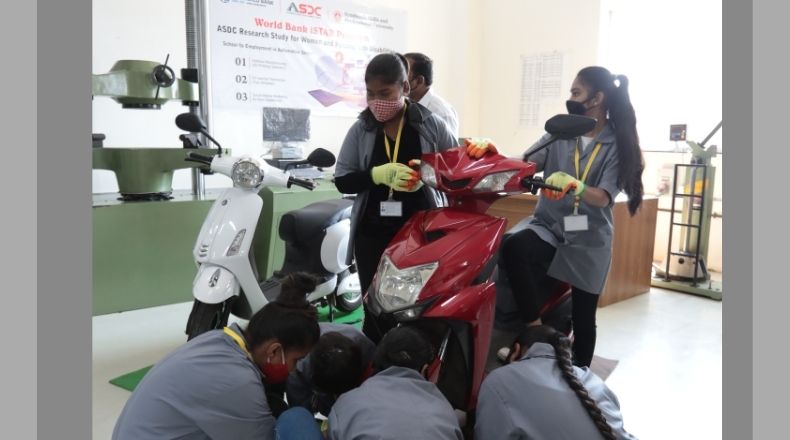
With rapid technological disruption, the Automotive industry is going through some major changes impacting the entire ecosystem. The pandemic has accelerated the transformation. The skill requirement of the industry is going to change along with the nature of the jobs.
Being at the forefront of skill development in the Automotive industry for the last 10 years, Automotive Skill Development Council (ASDC) has been a trailblazer in many ways. To know more about their journey so far and the initiatives to cope with the technological disruptions, Team NSN caught up with Mr. Nikunj Sanghi, Chairman, ASDC to congratulate the team on their tenth anniversary and learn about the present priorities and the road ahead.
Read on to know more about the first Sector Skill Council (SSC)! You can also watch the video interview on our YouTube channel, for which the link is given below.
Q. With the current industry scenario and the disruption of technology in the Automotive industry, what are the skills that are going to be in demand?
A: The Automotive industry in India is undergoing major transformations because of various factors. Technological disruption is one of them. The changes are going to impact the entire ecosystem starting from the manufacturers to the dealers. So, the Skill Gap Analysis Report by ASDC in collaboration with EY suggests major upskilling and reskilling of the workforce.
With automation taking over the Manufacturing industry, learning new skills like AI, ML, and Robotics would be essential for those who want to build a career in the Automotive industry. These skills would generate a number of new jobs for people in the future. The challenge here would be to upskill and reskill the manpower so that they remain relevant to the industry.
Q. Please tell us more about your collaborations with the industry and academia.
A: Collaborations with the industry, technology partners and academia will ensure successful implementation of the skill development initiatives. ASDC was able to collaborate with leading industries and technology leaders at the right time. The collaborations also involve cross continental partnerships like the partnership with the government of United Kingdom through the Department for International Development (DFID, now Foreign, Commonwealth and Development Office (FCDO)). Digital Training of Trainers (ToT) programs are a prominent part of ASDC’s collaboration with FCDO.
Apart from these collaborations, we are also associated with Electric Vehicle (EV) Manufactures which help us understand their needs and work accordingly.
 Q. With industry 4.0 in the picture, will there be a transition to a higher level of skilling?
Q. With industry 4.0 in the picture, will there be a transition to a higher level of skilling?
A: Technology is rapidly disrupting the entire skilling industry. So, it is crucial for us to go up the ladder in terms of skilling. While the skilling at the NSQF level 3, 4 and 5 would continue, we are graduating up to NSQF level 7, 8 and 9. And, to ensure industry-relevant skill development even at the higher level, we are continuously collaborating with skilling universities and academic institutions. We have started working on Qualification Packs (QPs) of those levels as well. We have a specific expert group devoted to working on higher-level skills.
Q. How has digital disruption following COVID-19 impacted skilling in the automotive industry?
A: The new normal in learning would be blended learning. The importance of good digital content would always be there. So, to provide our students with quality digital content, we have partnered with TCS iON to create a digital learning hub. Most of the content in the platform is free and others courses can be accessed at a very nominal cost. The courses would be available for the entire ecosystem and all our industry partners are providing us with quality content.
We have also developed a listing platform in collaboration with TCS iON. The platform will list all the stakeholders in the industry and provide people with jobs in their preferred location. The platform will also help students to select the right skill development programs for them as per the geographical needs. The pilot of the listing platform will be launched very soon.
Q. How do you ensure an effective industry-academia collaboration?
A: For ASDC, collaboration is the key and getting the industry and academia involved in the entire skill development process is crucial. We have three principal associations with the Automotive Component Manufacturers Association of India (ACMA), the Society of Indian Automobile Manufacturers (SIAM), and the Federation of Automobile Dealers Associations (FADA). The industry requirements are our priority. We are working on forming an expert group to work on R&D, the members of which would be experts from industries. All our contents are reviewed by the industry so they are industry-aligned and 25 of our QPs are approved by the government.
Along with the industry, it was important for us to be engaged with the government and the entire ecosystem. We ensure that our Governing Council is represented by the Ministry of Heavy Industries and Public Enterprises, MSDE, NSDC and MoRTH.
Also read: MG Motors launches ‘Dakshata’ in partnership with ASDC and Autobot India https://nationalskillsnetwork.in/mg-motors-launches-dakshata-in-partnership-with-asdc/
Apart from the industry and the government, academia also plays an important role in the successful implementation of any skill development initiative. ASDC has collaborated with various academic institutions and encouraged them to offer industry-relevant courses like Mechatronics. Our collaboration with these academic institutions would grow further in the future as well.
With an aim to reach the remote part of India, ASDC has partnered with many technology companies. Currently, we are exploring collaboration opportunities with technology giants like Google, Facebook and Microsoft. We have already launched our program in collaboration with Google. The courses are being offered in various Indian languages along with English. Next, we would be launching programs with Facebook following with Microsoft.














skill development rural development